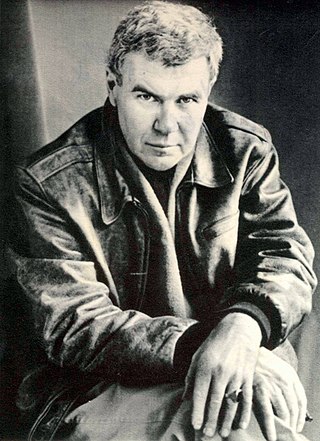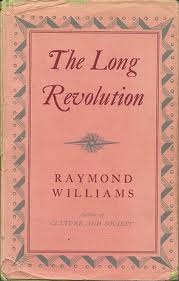
William Carlos Williams was an American poet, writer, and physician closely associated with modernism and imagism.

Raymond Henry Williams was a Welsh socialist writer, academic, novelist and critic influential within the New Left and in wider culture. His writings on politics, culture, the media and literature contributed to the Marxist critique of culture and the arts. Some 750,000 copies of his books were sold in UK editions alone, and there are many translations available. His work laid foundations for the field of cultural studies and cultural materialism.

Raymond Clevie Carver Jr. was an American short story writer and poet. He published his first collection of stories, Will You Please Be Quiet, Please?, in 1976. His breakout collection, What We Talk About When We Talk About Love (1981), received immediate acclaim and established Carver as an important figure in the literary world. It was followed by Cathedral (1983), which Carver considered his watershed and is widely regarded as his masterpiece. The definitive collection of his stories, Where I'm Calling From, was published shortly before his death in 1988. In their 1989 nomination of Carver for the Pulitzer Prize for Fiction, the jury concluded, "The revival in recent years of the short story is attributable in great measure to Carver's mastery of the form."

Terence Francis Eagleton is an English literary theorist, critic, and public intellectual. He is currently Distinguished Professor of English Literature at Lancaster University.

William Angus McIlvanney was a Scottish novelist, short story writer, and poet. He was known as Gus by friends and acquaintances. McIlvanney was a champion of gritty yet poetic literature; his works Laidlaw, The Papers of Tony Veitch, and Walking Wounded are all known for their portrayal of Glasgow in the 1970s. He is regarded as "the father of Tartan Noir" and as Scotland's Camus.

Sir Herbert Edward Read, was an English art historian, poet, literary critic and philosopher, best known for numerous books on art, which included influential volumes on the role of art in education. Read was co-founder of the Institute of Contemporary Arts. As well as being a prominent English anarchist, he was one of the earliest English writers to take notice of existentialism. He was co-editor with Michael Fordham and Gerhard Adler of the British edition in English of The Collected Works of C. G. Jung.

In a society, high culture encompasses cultural objects of aesthetic value, which a society collectively esteems as being exemplary works of art, and the intellectual works of literature and music, history and philosophy, which a society considers representative of their culture.
Multilineal evolution is a 20th-century social theory about the evolution of societies and cultures. It is composed of many competing theories by various sociologists and anthropologists. This theory has replaced the older 19th century set of theories of unilineal evolution, where evolutionists were deeply interested in making generalizations.
Television studies is an academic discipline that deals with critical approaches to television. Usually, it is distinguished from mass communication research, which tends to approach the topic from a social sciences perspective. Defining the field is problematic; some institutions and syllabuses do not distinguish it from media studies or classify it as a subfield of popular culture studies.

The Long Revolution is a 1961 book by Raymond Williams. The "long revolution" of the title is a revolution in culture, which Williams sees as having unfolded alongside the democratic revolution and the industrial revolution. It followed on from Culture and Society, which was his first widely read work.

The sociology of literature is a subfield of the sociology of culture. It studies the social production of literature and its social implications. A notable example is Pierre Bourdieu's 1992 Les Règles de L'Art: Genèse et Structure du Champ Littéraire, translated by Susan Emanuel as Rules of Art: Genesis and Structure of the Literary Field (1996).
Critical reading is a form of language analysis that does not take the given text at face value, but involves a deeper examination of the claims put forth as well as the supporting points and possible counterarguments. The ability to reinterpret and reconstruct for improved clarity and readability is also a component of critical reading. The identification of possible ambiguities and flaws in the author's reasoning, in addition to the ability to address them comprehensively, are essential to this process. Critical reading, much like academic writing, requires the linkage of evidential points to corresponding arguments.

Culture is a concept that encompasses the social behavior, institutions, and norms found in human societies, as well as the knowledge, beliefs, arts, laws, customs, capabilities, and habits of the individuals in these groups. Culture is often originated from or attributed to a specific region or location.

Illusion and Reality is a book of Marxist literary criticism by Christopher Caudwell published in 1937.
Cultural studies is a politically engaged postdisciplinary academic field that explores the dynamics of especially contemporary culture and its social and historical foundations. Cultural studies researchers generally investigate how cultural practices relate to wider systems of power associated with, or operating through, social phenomena. These include ideology, class structures, national formations, ethnicity, sexual orientation, gender, and generation. Employing cultural analysis, cultural studies views cultures not as fixed, bounded, stable, and discrete entities, but rather as constantly interacting and changing sets of practices and processes. The field of cultural studies encompasses a range of theoretical and methodological perspectives and practices. Although distinct from the discipline of cultural anthropology and the interdisciplinary field of ethnic studies, cultural studies draws upon and has contributed to each of these fields.
Political economy in anthropology is the application of the theories and methods of historical materialism to the traditional concerns of anthropology, including but not limited to non-capitalist societies. Political economy introduced questions of history and colonialism to ahistorical anthropological theories of social structure and culture. Most anthropologists moved away from modes of production analysis typical of structural Marxism, and focused instead on the complex historical relations of class, culture and hegemony in regions undergoing complex colonial and capitalist transitions in the emerging world system.
Technological determinism is a reductionist theory that assumes that a society's technology progresses by following its own internal logic of efficiency, while determining the development of the social structure and cultural values. The term is believed to have originated from Thorstein Veblen (1857–1929), an American sociologist and economist. The most radical technological determinist in the United States in the 20th century was most likely Clarence Ayres who was a follower of Thorstein Veblen and John Dewey. William Ogburn was also known for his radical technological determinism and his theory on cultural lag.
The Unfinished Conversation is a 2012 multi-layered three-screen installation directed by John Akomfrah, co-founder of the Black Audio Film Collective. Through his celebrated technique of juxtaposing and layering archive footage with text, music and photographs, Akomfrah crosses the memory landscape of Stuart Hall, Jamaican-born founder of British Cultural Studies, to reflect on the nature and complexities of memory and identity. The Unfinished Conversation was commissioned by Autograph ABP. It opened at Tate Britain, London, on 26 October 2013, following its premiere at Bluecoat during the 2012 Liverpool Biennial.
Michael Barratt Brown was a British economist, political activist and adult educator. He was a key figure in the creation of the British New Left in the period after the Soviet invasion of Hungary; he helped to found the Fair Trade movement in Britain; and he was the first Principal of Northern College, a residential centre for adult learners in South Yorkshire.
Marxist cultural analysis is a form of cultural analysis and anti-capitalist cultural critique, which assumes the theory of cultural hegemony and from this specifically targets those aspects of culture which are profit driven and mass-produced under capitalism.










